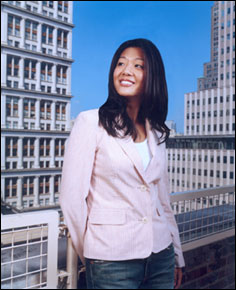|
The
relevance of this book is surprisingly deceptive. It's choice bits of
right on target political, social, and especially environmental
commentary are carefully camouflaged within the text. What starts out as
a rather mundane discourse on the vacuous values of shopping, packaged
to appeal to your average Hamptonite sensibilities, suddenly turns dead
serious, dedicating the last three chapters to sweatshops, the
ecological consequences of dry cleaning, and the use of fur. |
Fashion Victim |
|
|
|
|
Michelle Lee |
